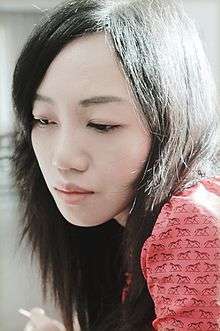Zhang Yueran
Zhang Yueran (Chinese: 张悦然, born 7 November 1982) is a Chinese writer.
Zhang Yueran | |
|---|---|
 | |
| Born | 张悦然 7 November 1982 |
| Alma mater | Shandong University |
| Occupation | Writer, teacher[1] |
Early life
In 1982, Zhang was born Jinan, Shandong. She is the only daughter to her parents. Her father was a professor of Shandong University, and he was very keen on literature.[2]
Zhang is the alumni of Shandong Experimental High School, Shandong University and National University of Singapore.[3][4]
Career
Writer
[5] Her main works include short stories and novels. She won the 2001 New Concept Writing Competition organised by Mengya magazine.[6] She is often labeled as part of a group of successful Chinese authors known as the "post-'80s" generation.[7][8][9][10]
In 2011, she participated in the International Writing Program Fall Residency at the University of Iowa in Iowa City, IA.[11]
| Wikimedia Commons has media related to Zhang Yueran. |
Teacher
Nowadays Zhang is a teacher of Literary Studies in Renmin University of China.[12]
Publications
- "葵花走失在1890" Sunflowers Got Lost in 1890
- "樱桃之远" Cherry Story
- "是你来检阅我的忧伤了吗" You Come to My Sorrow
- "十爱" Ten Love Stories
- "水仙已乘鲤鱼去" Narcissus
- "誓鸟" Birds of Swear
- "鲤系列"Carp Series
- "昼若夜房间" A Room of Day and Night
References
- “语文老师”张悦然 Retrieved 2 January 2017
- 张悦然:现实中,我的父亲挺正常的 Retrieved 2 January 2017
- 山东省实验中学传奇 Retrieved 2 January 2017
- 追溯历史 直面父辈创伤 80后张悦然开始写历史 Retrieved 2 January 2017
- Aijun Zhu (2007). Feminism and global Chineseness. Cambria Press. p. xix. ISBN 978-1-934043-12-7.
- Hui Yu; Xianghua Ai (2007). Reading in China. China Intercontinental Press. p. 23. ISBN 978-7-5085-1138-2.
- King, Aventurina (4 May 2008). "China's Pop Fiction". The New York Times. Retrieved 25 April 2009.
- 旧墙上的新窗子——作家张悦然专访 Retrieved 2 January 2017
- 张悦然:我们的青春结束了 但愿阅读没有结束 Retrieved 2 January 2017
- 张悦然 青春走远 破“茧”而出 Retrieved 2 January 2017
- "2011 Resident Participants | The International Writing Program". iwp.uiowa.edu. Retrieved 12 April 2017.
- 张悦然:我们早慧而晚熟 出发虽迟终会抵达 Retrieved 2 January 2017